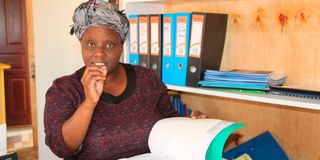GBV survivor championing girls’ and widows’ rights

Cynthia Kananu, the founder of Inua Mama Mjane during the interview at her office in Meru on December 16, 2022. The organisation champions the rights of girls and widows.
What you need to know:
- Cynthia Kananu initiated the conversation on the unconstitutionality of the law denying widows the right to inherited property after they remarry.
- She got into early marriage after falling pregnant while in Form Three.
- Ms Kananu is the founder of Inua Mama Mjane, a community-based organization that supports widows.
When Meru High Court declared sections of the Succession Act unconstitutional for denying widows the right to inherited property after they remarry, Inua Mama Mjane, a community-based organization, came to the limelight.
Cynthia Kananu, the founder, says after she initiated the conversation on the unconstitutionality of the law, Ripples International, a non-governmental organisation that protects the rights of women and children, filed the petition.
Federation of Women Lawyers (Fida) Kenya and Inua Mama Mjane were enjoined as interested parties.
Justice Edward Murithi found that section 35 (1) (b) and section 36 (1) (b) were unconstitutional. The cited parts of Section 35 and Section 36 of the Act denies widows the right to the deceased husband's estate if she remarries.
Ms Kananu says the September 29, 2022, judgment demonstrated that sections of the law that are offensive can be amended if there are people willing to champion the change.
“As a champion of the rights of widows and girls, I discovered that there is a lot we can do to change the law and influence society. What we need to do, as leaders, is to identify these areas that need amendments and push for the changes,” she said during an interview in Meru.
Form Three
“After the courts made their declaration on the illegality of the law we now await its amendment by Parliament and hope it happens soon so that widows can benefit from the changes.”
But even as Ms Kananu basks in the glory of a land mark judgment that is bound to alter the way Kenyans view inheritance by widows, what is more interesting is how she got into activism that led to the changes.
A survivor of domestic violence, Ms Kananu got into early marriage after falling pregnant while in Form Three. She, however, endured an abusive marriage, secretly went back to school and sat her Kenya Certificate of Secondary Education (KCSE) examination, obtaining a grade C.
She says when her husband passed on in 2010, ushering her into widowhood at an early age of 29, she found herself in an unfamiliar territory. She started figuring out what to do.
“I set up a salon and as I struggled to raise my family, I discovered that there were other women who were going through the same experiences. They would join me in my salon and in the process, we formed a merry-go-round group of 20 widows. Out of this initiative, Inua Mama Mjane was born in February 2018,” she says.
She, however, faced challenges since she did not have resources, and mobilized members into contributing as little as Sh20 per week. The money went into supporting the vulnerable widows and their families.
Her efforts finally paid off when last year, her organization was selected to benefit from a five-year funding by Young Women Christian Association (YWCA) in a global programme funded by the Dutch Embassy targeting girls below the age of 30 years.
This year, she won the United Kingdom based MTM International Award for Excellence and Achievement, which recognized her efforts in championing girls’ and widows’ rights.
Ms Kananu says rising incidents of gender-based violence in the country, especially in Meru, is alarming, adding that teenagers are more vulnerable.
Societal crisis
“Young people are at higher risk today because of the changing patterns of lifestyle in the society. Parents have become so irresponsible that they don’t care about other people’s children,” says the mother of two.
Data obtained from the Gender department of Meru County, for example, shows that SGBV cases have been on the rise, with activists saying a solution must be found to avert a societal crisis in the future.
It says that about 400 cases of rape and defilement were reported in the two months to November this year. Another more than 9,100 cases of physical and emotional abuse were recorded by the Health department’s gender desk during the same period.
“Out of the 400 sexual violence cases, 27 were male victims while 376 were female. On physical and emotional abuse, 3,230 men and 5,904 women were affected within two months. More cases of violence against men are being reported,” said an officer in the department.
Ms Kananu laments that even as the cases are reported daily, victims have not been helped to cope with the situation, with most of them being left in the hands of their victims.
This is even as a GBV rescue centre built at a cost of Sh50 million and commissioned by former Public Service Cabinet Secretary Prof Margaret Kobia in June this year, remains unutilized.
SGBV policy
During its launch Prof Kobia said a clinic would be established at the centre that would take care of those who seek the services there. Funded by the National Government Affirmative Action Fund (NGAAF), the centre is one among three others in Bungoma, Migori, Kisii and Vihiga counties.
The centre was expected to offer a temporary shelter for SGBV survivors as they await investigations and the court process in the conclusion of their cases, and protect survivors from the perpetrators.
“Meru was among the first counties to launch the Sexual Gender-Based Violence Policy in 2019. While this is laudable, a lot remains to be done in ensuring the rights of women and girls in the county are protected. It is sad that such a facility is not functional, yet there are people suffering out there,” she says.





